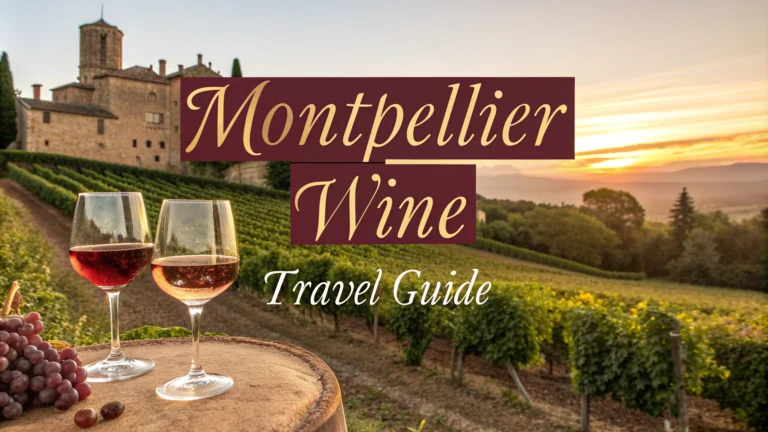Montpellier: Gateway to Languedoc-Roussillon’s Wine Country
Montpellier, the vibrant capital of the Languedoc-Roussillon region, offers a perfect blend of history, culture, and wine experiences. Its Mediterranean climate and proximity to renowned vineyards make it an ideal base for wine enthusiasts exploring southern France.
Towns and Villages
Pézenas
This charming medieval town, just 35 km from Montpellier, is known for its well-preserved historic center and connection to Molière. Visit the Maison des Métiers d’Art to see local artisans at work.
Sète
Often called the “Venice of Languedoc,” Sète is a picturesque port town famous for its canals and seafood. Don’t miss the Halles de Sète market for fresh local produce and wines.
Wine Producers
Château de Flaugergues
Located on the outskirts of Montpellier, this 17th-century estate offers guided tours and tastings of their award-winning wines. Their Cuvée Sommelière red blend is particularly noteworthy.
Mas de Daumas Gassac
Often referred to as the “Lafite of the Languedoc,” this renowned winery in Aniane produces exceptional red and white wines. Book a tour to explore their unique terroir and winemaking philosophy.
Accommodations
Domaine de Verchant
This luxurious wine estate and hotel offers a perfect blend of comfort and wine experiences. Enjoy their spa, restaurant, and private wine tastings just minutes from Montpellier’s city center.
Baudon de Mauny
For a more intimate stay, this boutique hotel in a restored 18th-century mansion in Montpellier’s historic center provides a stylish base for exploring the region’s wine scene.
Dining
La Coquerie
This Michelin-starred restaurant in Sète offers innovative seafood dishes paired with an extensive local wine list. Try their tasting menu for a culinary journey through the region.
Le Petit Jardin
Nestled in Montpellier’s historic center, this charming restaurant features a beautiful garden setting and a menu that highlights regional ingredients and wines. Their confit de canard paired with a local Syrah is a must-try.
Wine Shops & Bars
La Maison Régionale des Vins et du Languedoc
This wine shop in Montpellier offers an extensive selection of local wines. Join their weekly tastings to sample different appellations.
N’Apéro
A trendy wine bar in Montpellier’s historic center. Enjoy flights of local wines paired with artisanal charcuterie and cheese plates.
Other Shops
Les Halles Castellane
This covered market in Montpellier is perfect for sourcing local ingredients. Look for Roquefort cheese and olive oils from nearby producers.
L’Atelier des Vignerons
A boutique in Pézenas specializing in wine-related gifts and accessories. Pick up a hand-crafted wine opener as a souvenir.
Attractions
Musée Fabre
Montpellier’s premier art museum houses an impressive collection of European art. Look for paintings depicting the region’s viticultural history.
Pic Saint-Loup
This distinctive peak offers hiking trails with panoramic views of surrounding vineyards. Pack a picnic with local wines and cheeses for the summit.
Events
Faugères Wine Festival
Held annually in July, this festival in the village of Faugères celebrates the local AOC wines. Enjoy tastings, vineyard tours, and live music.
Vinisud
This biennial wine trade fair in Montpellier showcases Mediterranean wines. While primarily for professionals, some events are open to the public.
Appellations
Pic Saint-Loup
Known for its bold red blends, this appellation produces wines with great aging potential. Look for bottles featuring Syrah, Grenache, and Mourvèdre.
Faugères
This hilly appellation is renowned for its schist soils, producing mineral-driven reds and rosés. Try the Domaine Leon Barral for exceptional organic wines.
Grape Varieties
Montpellier and the Languedoc-Roussillon region are home to a diverse array of grape varieties. Grenache, Syrah, and Mourvèdre dominate red wine production.
White wines often feature Chardonnay, Viognier, and Picpoul. The region’s unique climate allows for both traditional and experimental varietals to thrive.
Main Wine Styles
The region produces a wide range of wine styles. Full-bodied reds from Corbières and Minervois are popular choices.
Crisp whites from Picpoul de Pinet and sparkling Blanquette de Limoux offer refreshing alternatives. The area is also known for its rosé wines, perfect for sunny Mediterranean days.
Food Specialties
Languedoc-Roussillon cuisine pairs perfectly with local wines. Cassoulet, a hearty bean and meat stew, is a regional favorite.
Seafood dishes like oysters from Bouzigues and tielle sétoise (octopus pie) showcase the Mediterranean influence. Don’t miss the local cheeses, including Pélardon and Roquefort.
Drives & Walks
Explore the region’s beauty through scenic drives and walks. The Route des Vignobles offers a picturesque journey through vineyard-covered hills.
For hikers, the Pic Saint-Loup trail provides stunning views of the surrounding wine country. Consider a stroll through the historic center of Montpellier, stopping at wine bars along the way.
Itineraries
A 3-day wine tour could include visits to Pic Saint-Loup vineyards, tastings in Corbières, and exploring Montpellier’s wine scene.
For a week-long trip, add excursions to coastal wineries near Sète, explore the medieval town of Carcassonne, and enjoy a day of wine tasting in the Minervois region.
Getting There & Around
Montpellier-Méditerranée Airport serves as the main gateway to the region. TGV trains connect Montpellier to Paris in under 4 hours.
Renting a car is ideal for exploring vineyards. Local buses and the tramway system in Montpellier provide convenient public transportation options.
Best Time to Visit
Spring (April-June) and fall (September-October) offer pleasant weather and fewer crowds. These seasons are perfect for wine tasting and outdoor activities.
Summer (July-August) brings vibrant festivals but also peak tourist season. Winter (November-March) is quieter, ideal for budget travelers and cozy wine experiences.
Sustainability Efforts
Many vineyards in Languedoc-Roussillon are adopting organic and biodynamic practices. Look for certifications like AB (Agriculture Biologique) on wine labels.
Some wineries offer eco-tours showcasing sustainable viticulture. The region promotes local, seasonal produce in restaurants, supporting sustainable agriculture.
Language Tips
Basic French phrases go a long way. Learn wine-related terms like “dégustation” (tasting) and “cave” (wine cellar).
Many wineries offer tours in English, but calling ahead is recommended. In Montpellier, English is widely spoken in tourist areas.
Further Resources
Visit the official Occitanie Tourism website for comprehensive regional information.
Download the “Vins du Languedoc” app for a digital guide to local wineries and appellations. Languedoc Wines offers in-depth information on regional wines.

